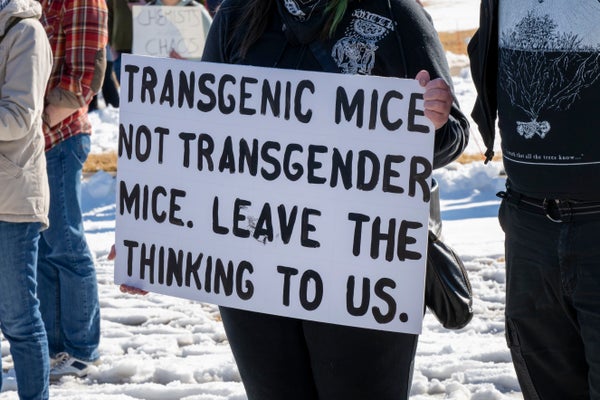www.scientificamerican.com
April 2, 20254 min readTrump Administration Attacks on Science Trigger Backlash from ResearchersThe risks of remaining silent at this defining time are far greater than the risks of speaking out, says one scientist regarding the Trump administrations attacks on scienceBy Dan Vergano edited by Jeanna BrynerSt. Paul, Minnesota. State capitol. Stand up for science rally. University of Minnesota researchers, scientists and other supporters protested against President Donald Trump's proposed scientific research funding cuts. Michael Siluk/UCG/Universal Images Group via Getty ImagesSlashed funding, mass firings and political edicts over what can be studied or spoken recently prompted an open letter that was signed by a sizable swath of the nations leading researchers, all members of the National Academies of Sciences, Engineering and Medicine.The voice of science must not be silenced, read the letter, which was released on March 31. We all benefit from science, and we all stand to lose if the nations research enterprise is destroyed.So far about 1,900 members of the National Academies have signed the open letter. The National Academies themselves, which were chartered by Congress to provide scientific and technological advice, did not sign on. But a significant fraction of their overall membership of thousands of researchers, who were elected for their technical prowess and achievements, did so.On supporting science journalismIf you're enjoying this article, consider supporting our award-winning journalism by subscribing. By purchasing a subscription you are helping to ensure the future of impactful stories about the discoveries and ideas shaping our world today.Across the three academies, theres widespread concern about the impact of executive orders and decisions, both on U.S. science and on the well-being of the public, on our ability to continue to have clean air and clean water, [on] the economy, says climate scientist Benjamin Santer, who was formerly at Lawrence Livermore National Laboratory (LLNL) and was one of 13 scientists who co-wrote the letter. All of that is imperiled.In its first two months, the Trump administration has targeted the U.S. research enterprise in numerous ways, including cuts to funding for the National Institutes of Health, firings at agencies such as the Environmental Protection Agency, the Department of Health and Human Services, and the National Science Foundation and threats to university funding over equal employment and diversity offices. President Donald Trump derided hormone health studies as making mice transgender in a March speech to Congress, and his administration has banned words connected to climate science and racial equality at federal agencies and labs. These institutions have included LLNL, where Santer published pioneering studies documenting humans effect on the climate in the 1990s.Think about it. We cant talk about reality, Santer says. We cant talk about what is actually happening in the real world that affects all of us.From Albert Einstein to J. Robert Oppenheimer, scientists have long braved dangerous political moments in public life. For example, many nuclear scientists championed arms control throughout the cold war. During the first Trump administration, members of the National Academy of Sciences, including Santer, released two open letters that decried the U.S.s withdrawal from the Paris climate agreement and wider government attacks on science. The March letter, however, represents a first in that it comes from members of all three National Academies and was aimed at the public and lawmakers under the new Trump administration.At the end of the day, the scientific community needs to convince Congress that attacks on science are an attack on Congresss regulatory authority. [Such attacks are] bad for their districts and a threat to members chances at earning reelection, says political scientist Matt Motta of the Boston University School of Public Health, who was not a signatory to the new open letter. I think that this letter helps sound that alarm and is likely a course of action worth takingdespite the potential risk of partisan backlash.In public surveys, confidence in scientists remains high compared with trust in Congress or Trump. There is a partisan split on views on science, however, with Republican voters being more critical of federal agencies. In fact, I would argue that the purpose of the administration efforts is to damage researchers, particularly those at universities, says economist David Card of the University of California, Berkeley, who has studied membership in the National Academies and also was not a signatory to the March letter. For many supporters, [the open letter] will be interpreted as evidence that the administration is doing the right thing.Concerns about the Trump administrations attacks on their institutions and on immigrant students dissuaded some scientists from signing the open letter, says Steven H. Woolf, director emeritus of the Center on Society and Health at Virginia Commonwealth University School of Medicine and one of the letters co-authors. Under the administrations demands, Columbia University acquiesced to cracking down on student protests and putting its Middle Eastern, South Asian and African studies department under new supervision in March. A Harvard Medical School researcher who has been on a scholar visa from Russia has been detained at an immigration detention center in Louisiana, and a Turkish student who was studying childhood development at Tufts University was grabbed off a street by immigration officials for writing an opinion piece that was critical of the U.S.s policy toward Gaza.There are risks associated with using your voice in the United States in the spring of 2025, Santer says. I strongly believe that the risks of remaining silent at this defining time are far greater than the risks of speaking out.*We respect our members point of view and their commitment to speaking out on these important issues, wrote the National Academies regarding the open letter in a statement to Scientific American. The academies are committed to impartial non-partisan scientific advice, the statement added.Beyond open letters, scientists need to reach Congress in person and through their scientific societies to push back against Trump, says Jon Miller of the Institute for Social Research at the University of Michigan. Patient advocacy groups need to hear from scientists to push lawmakers as well, he says. Campaign contributions and endorsements are far more effective than signing petitions, Miller adds.*Editors Note (4/2/25): This sentence was edited after posting to better clarify Benjamin Santers comments.












